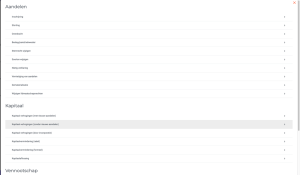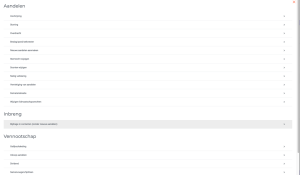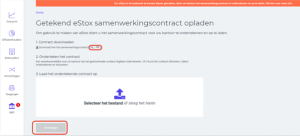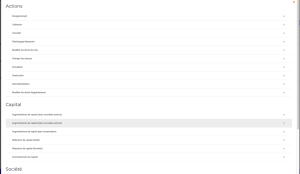Als ITAA-lid kan u sinds eind april gebruik maken van het nieuwe platform permanente vorming. . We hebben ondertussen getracht om a.d.h.v. uw vragen, bemerkingen en suggesties bijkomende nuttige functionaliteiten te voorzien die beschikbaar zijn zodat het voor u nog makkelijker wordt om uw verslagen te raadplegen en al dan niet aan te passen.
Wij herhalen hierbij nogmaals het uitgangspunt dat de erkende vormingsoperatoren uw aanwezigheden rechtstreeks in uw verslag permanente vorming zullen opladen, dit bespaart u héél veel tijd en kopzorgen.
Hieronder geven wij u een overzicht van de belangrijkste nieuwe functionaliteiten voor u als lid:
Overzicht vormingsactiviteiten:
In het overzicht kan u de ingevoerde vormingen raadplegen, zowel deze die u zelf heeft ingevoerd als deze die door de erkende vormingsoperatoren werden ingevoerd
Nieuw:
- Door een bepaalde vormingsactiviteit aan te klikken kan u nu ook deze vorming raadplegen en alle informatie bekijken
- Verwijderen van een vormingsactiviteit:
- Verwijderen is mogelijk voor activiteiten die u zelf heeft ingediend, ongeacht of deze reeds goedgekeurd werden of niet.
- Dit dient bvb. te gebeuren wanneer u merkt dat een vormingsactiviteit meermaals of foutief werd ingevoerd,
- Opgelet, een vormingsactiviteit ingevoerd door een erkende vormingsoperator, kan NIET verwijderd noch aangepast worden, deze registratie is bindend
- Wijzigen van een vormingsactiviteit:
- Indien een vormingsactiviteit werd afgekeurd door de diensten van het ITAA, bvB. wegens ontbrekende informatie, zal u deze vorming eenvoudigweg kunnen aanpassen of aanvullen en opnieuw doorsturen voor behandeling. Op die manier dient u niet helemaal opnieuw te beginnen
Informatie bij een ingevoerde vormingsactiviteit:
De uren permanente vorming gevolgd bij een erkende vormingsoperator worden door deze vormingsoperator in principe geregistreerd op het platform waardoor deze automatisch in uw overzicht van goedgekeurde vormingsactiviteiten terechtkomen. Andere activiteiten dient u zelf nog toe te voegen, zoals bvb. een vorming gevolgd bij een niet-erkende vormingsoperator of een doceeractiviteit.
Nieuw:
- Op het einde van het invoeren van uw aanvraag voor een vorming, zal u – vooraleer op de knop “indienen” te drukken – volgend overzicht krijgen:
- soort vorming
- de naam van de vormingsoperator
- de naam/namen van de opleider(s)
- de datum
- de behandelde relevante vakgebieden
- de opgeladen bestanden
- het aantal vormingsuren
- de categorie waartoe de ingevoerde vorming behoort
Ga na of deze informatie correct is alvorens op de knop “indienen” te klikken, dit bespaart u tijd en werk
Behandeling van uw vormingsaanvragen door de diensten van het Instituut:
Nieuw:
Nadat uw vormingsaanvraag behandeld werd door de diensten van het Instituut, zal u een e-mail ontvangen met de melding dat uw aanvraag werd goed- of afgekeurd.
In het geval uw vorming werd afgekeurd zal u doorverwezen worden naar uw verslag permanente vorming waar u voor de betreffende vorming de reden zal kunnen raadplegen. U kan uw vormingsaanvraag desgewenst aanpassen en opnieuw doorsturen zoals hierboven reeds aangegeven.
Valideren van uw jaarverslag:
Nieuw:
Door op de knop “jaarverslag” te klikken kan u uw verslag permanente vorming valideren.
- Worden er uren weergegeven in het rood dan wijzen deze mogelijks op een onvoldoend aantal uren volgens de Norm permanente vorming, bvb. indien voor het desbetreffende jaar minder dan 20u permanente vorming opgenomen is. Hierbij wordt geen rekening gehouden met door de Raad van het ITAA toegestane uitzonderingen (bvb. o.b.v. medische attesten, maatregelen COVID-19). Voorbeeld 1: kalenderjaar 2020 wegens COVID-19. Hiermee wordt uiteraard rekening gehouden, omdat voor 2020 het minimum aantal vormingsuren van 120u/3 jaar uitzonderlijk naar 100u/3 werd herleid
- Voorbeeld 2: u heeft het Instituut in kennis gesteld dat u wegens medische redenen niet kon deelnemen aan permanente vorming. Een medisch attest (zonder details) werd overgemaakt aan het Instituut en werd aan uw persoonlijk dossier toegevoegd
U kan, na het invoeren van ontbrekende vormingsattesten (vanaf 01/01/2021), opnieuw uw verslag valideren, er verschijnt dan een bijkomende lijn.
U kan pas valideren na het afsluiten van het lopende kalenderjaar.
Controle van de vakgebieden:
Nieuw
U kan zelf uw programma permanente vorming samenstellen met een evenwicht tussen de verschillende relevante vakgebieden over een periode van 3 jaar.
Om na te gaan of u het evenwicht gerespecteerd heeft kan u in deze rubriek nagaan waar u nog dient bij te benen.
U kan de vormingen voor de ontbrekende relevante vakgebieden opzoeken via de kalender permanente vorming, vergeet de taal, waarin u de vorming wenst te volgen, niet aan te duiden.










